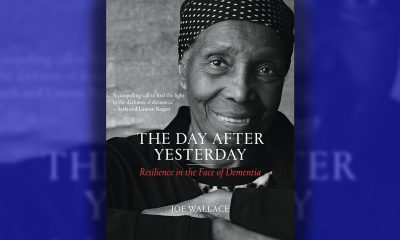Business
Questions and Answers About the Expiring Export-Import Bank

Secretary of State John Kerry addresses a gathering of the Export-Import Bank at the Omni-Shoreham Hotel in Washington, Thursday, April 24, 2014. (AP Photo)
ERICA WERNER, Associated Press
WASHINGTON (AP) — The Export-Import Bank expires Tuesday at midnight for the first time since the small federal agency was created during the Depression to help U.S. businesses export their products. Congress failed to renew the bank’s charter because of opposition from Republicans who say it amounts to corporate welfare. However, the shutdown may end up being only temporary.
Some questions and answers about the Export-Import Bank, and its future:
___
Q: What does the Export-Import Bank do?
A: The federal Export-Import Bank’s principal role is to guarantee commercial bank loans made to foreign businesses and governments to buy U.S. products. That means U.S. taxpayers would pick up the tab if, say, a company in South America defaulted on a commercial bank loan it got to buy a Caterpillar tractor.
The Export-Import Bank also makes direct loans and provides export credit insurance to protect against losses to companies from non-repayment of loans.
The bank says that last year it authorized $20 billion worth of transactions which supported $27.5 billion of U.S. exports and 164,000 U.S. jobs. And it says it has a default rate of less than 1 percent.
___
Q: Why is the Export-Import Bank needed?
A: That’s the question at the heart of the current debate in Congress.
Opponents, including conservative lawmakers, groups like the Heritage Foundation and the GOP’s presidential candidates, say it isn’t needed at all. They point out that the vast majority of U.S. exporting is conducted without government support. They argue that the Export-Import Bank primarily supports big businesses that don’t really need the help, such as Boeing and GE. And they say the bank amounts to “crony capitalism” and the government picking winners and losers.
“Where is the fairness in giving Washington politicians and bureaucrats the power to pick who gets helped and who gets hurt?” asked GOP Rep. Jeb Hensarling of Texas, chairman of the House Financial Services Committee and a leading opponent of the bank.
But supporters like the U.S. Chamber of Commerce and National Association of Manufacturers say the Export-Import Bank plays a critical role in stepping in where commercial lenders can’t. Government backing can be needed because of the huge amounts of money involved in big purchases such as aircraft, or to help U.S. companies protect against the risk of default from a little-known buyer in a foreign country.
Supporters also note that foreign competitors such as China have foreign credit agencies more generous than the Export-Import Bank, and so U.S. businesses would be at a competitive disadvantage without it.
“We ought to reauthorize the bank and provide certainty to businesses and their workers who depend on it to level the playing field against foreign competitors,” said House Minority Whip Steny Hoyer, D-Md.
___
Q: Whom does the Export-Import Bank help?
A: Opponents argue that the bank primarily helps big businesses — and that is true if you measure its spending in dollars. Of the $20.5 billion in financing and insurance authorized by the bank in 2014, just over $5 billion of that was for small business exporters, according to bank officials.
However, supporters note that if you count the number of transactions, many more small businesses are helped than big ones. It’s just that the amounts spent on them are much smaller.
___
Q: What will happen when the Export-Import Bank’s charter expires?
A: The bank will lose its ability to make new loans when its charter expires Tuesday at midnight. However, it will stay in business to service outstanding loans. Supporters warn that even a short-term shutdown could disrupt some deals that are in the pipeline, but any impacts would likely go unnoticed by the vast majority of the public.
___
Q: Why is Congress letting the Export-Import Bank’s charter expire, and will lawmakers revive it?
A: Congress has renewed the Export-Import Bank’s charter on a bipartisan basis with little controversy over the years. But recently, the obscure agency has become something of a conservative purity test, with tea party-backed lawmakers and groups attacking it and rallying fellow Republicans to defy the business community and turn against it. That’s caused leading Republicans who once supported the bank, such as House Majority Leader Kevin McCarthy, R-Calif., to oppose it. The GOP’s presidential candidates also have lined up against it. Amid that opposition, it was easier for congressional leaders to let the bank expire than to try to take action to renew it.
However, lawmakers of both parties say the bank commands enough support to pass Congress, and it looks like it could do just that in July. Supporters plan to try to attach it to must-pass highway legislation in the Senate, which could also get it through the House.
“Looks to me like they have the votes, and I’m going to give them the opportunity,” Senate Majority Leader Mitch McConnell, R-Ky., told The Associated Press on Monday.
___
Associated Press writer Laurie Kellman contributed to this report.
Copyright 2015 The Associated Press. All rights reserved. This material may not be published, broadcast, rewritten or redistributed.
Bay Area
State Controller Malia Cohen Keynote Speaker at S.F. Wealth Conference
California State Controller Malia Cohen delivered the keynote speech to over 50 business women at the Black Wealth Brunch held on March 28 at the War Memorial and Performing Arts Center at 301 Van Ness Ave. in San Francisco. The Enterprising Women Networking SF Chapter of the American Business Women’s Association (ABWA) hosted the Green Room event to launch its platform designed to close the racial wealth gap in Black and Brown communities.

By Carla Thomas
California State Controller Malia Cohen delivered the keynote speech to over 50 business women at the Black Wealth Brunch held on March 28 at the War Memorial and Performing Arts Center at 301 Van Ness Ave. in San Francisco.
The Enterprising Women Networking SF Chapter of the American Business Women’s Association (ABWA) hosted the Green Room event to launch its platform designed to close the racial wealth gap in Black and Brown communities.
“Our goal is to educate Black and Brown families in the masses about financial wellness, wealth building, and how to protect and preserve wealth,” said ABWA San Francisco Chapter President LaRonda Smith.
ABWA’s mission is to bring together businesswomen of diverse occupations and provide opportunities for them to help themselves and others grow personally and professionally through leadership, education, networking support, and national recognition.
“This day is about recognizing influential women, hearing from an accomplished woman as our keynote speaker and allowing women to come together as powerful people,” said ABWA SF Chapter Vice President Velma Landers.
More than 60 attendees dined on the culinary delights of Chef Sharon Lee of The Spot catering, which included a full soul food brunch of skewered shrimp, chicken, blackened salmon, and mac and cheese.
Cohen discussed the many economic disparities women and people of color face. From pay equity to financial literacy, Cohen shared not only statistics, but was excited about a new solution in motion which entailed partnering with Californians for Financial Education.
“I want everyone to reach their full potential,” she said. “Just a few weeks ago in Sacramento, I partnered with an organization, Californians for Financial Education.
“We gathered 990 signatures and submitted it to the [California] Secretary of State to get an initiative on the ballot that guarantees personal finance courses for every public school kid in the state of California.
“Every California student deserves an equal opportunity to learn about filing taxes, interest rates, budgets, and understanding the impact of credit scores. The way we begin to do that is to teach it,” Cohen said.
By equipping students with information, Cohen hopes to close the financial wealth gap, and give everyone an opportunity to reach their full financial potential. “They have to first be equipped with the information and education is the key. Then all we need are opportunities to step into spaces and places of power.”
Cohen went on to share that in her own upbringing, she was not guided on financial principles that could jump start her finances. “Communities of color don’t have the same information and I don’t know about you, but I did not grow up listening to my parents discussing their assets, their investments, and diversifying their portfolio. This is the kind of nomenclature and language we are trying to introduce to our future generations so we can pivot from a life of poverty so we can pivot away and never return to poverty.”
Cohen urged audience members to pass the initiative on the November 2024 ballot.
“When we come together as women, uplift women, and support women, we all win. By networking and learning together, we can continue to build generational wealth,” said Landers. “Passing a powerful initiative will ensure the next generation of California students will be empowered to make more informed financial decisions, decisions that will last them a lifetime.”
Business
Black Business Summit Focuses on Equity, Access and Data
The California African American Chamber of Commerce hosted its second annual “State of the California African American Economy Summit,” with the aim of bolstering Black economic influence through education and fellowship. Held Jan. 24 to Jan. 25 at the Westin Los Angeles Airport Hotel, the convention brought together some of the most influential Black business leaders, policy makers and economic thinkers in the state. The discussions focused on a wide range of economic topics pertinent to California’s African American business community, including policy, government contracts, and equity, and more.

By Solomon O. Smith, California Black Media
The California African American Chamber of Commerce hosted its second annual “State of the California African American Economy Summit,” with the aim of bolstering Black economic influence through education and fellowship.
Held Jan. 24 to Jan. 25 at the Westin Los Angeles Airport Hotel, the convention brought together some of the most influential Black business leaders, policy makers and economic thinkers in the state. The discussions focused on a wide range of economic topics pertinent to California’s African American business community, including policy, government contracts, and equity, and more.
Toks Omishakin, Secretary of the California State Transportation Agency (CALSTA) was a guest at the event. He told attendees about his department’s efforts to increase access for Black business owners.
“One thing I’m taking away from this for sure is we’re going to have to do a better job of connecting through your chambers of all these opportunities of billions of dollars that are coming down the pike. I’m honestly disappointed that people don’t know, so we’ll do better,” said Omishakin.
Lueathel Seawood, the president of the African American Chamber of Commerce of San Joaquin County, expressed frustration with obtaining federal contracts for small businesses, and completing the process. She observed that once a small business was certified as DBE, a Disadvantaged Business Enterprises, there was little help getting to the next step.
Omishakin admitted there is more work to be done to help them complete the process and include them in upcoming projects. However, the high-speed rail system expansion by the California High-Speed Rail Authority has set a goal of 30% participation from small businesses — only 10 percent is set aside for DBE.
The importance of Diversity, Equity and Inclusion (DEI) in economics was reinforced during the “State of the California Economy” talk led by author and economist Julianne Malveaux, and Anthony Asadullah Samad, Executive Director of the Mervyn Dymally African American Political and Economic Institute (MDAAPEI) at California State University, Dominguez Hills.
Assaults on DEI disproportionately affect women of color and Black women, according to Malveaux. When asked what role the loss of DEI might serve in economics, she suggested a more sinister purpose.
“The genesis of all this is anti-blackness. So, your question about how this fits into the economy is economic exclusion, that essentially has been promoted as public policy,” said Malveaux.
The most anticipated speaker at the event was Janice Bryant Howroyd known affectionately to her peers as “JBH.” She is one of the first Black women to run and own a multi-billion-dollar company. Her company ActOne Group, is one of the largest, and most recognized, hiring, staffing and human resources firms in the world. She is the author of “Acting Up” and has a profile on Forbes.
Chairman of the board of directors of the California African American Chamber of Commerce, Timothy Alan Simon, a lawyer and the first Black Appointments Secretary in the Office of the Governor of California, moderated. They discussed the state of Black entrepreneurship in the country and Howroyd gave advice to other business owners.
“We look to inspire and educate,” said Howroyd. “Inspiration is great but when I’ve got people’s attention, I want to teach them something.”
Activism
Oakland Post: Week of April 17 – 23, 2024
The printed Weekly Edition of the Oakland Post: Week of April 17 – 23, 2024

To enlarge your view of this issue, use the slider, magnifying glass icon or full page icon in the lower right corner of the browser window. ![]()
-

 Activism4 weeks ago
Activism4 weeks agoOakland Post: Week of March 27 – April 2, 2024
-

 #NNPA BlackPress4 weeks ago
#NNPA BlackPress4 weeks agoCOMMENTARY: D.C. Crime Bill Fails to Address Root Causes of Violence and Incarceration
-

 #NNPA BlackPress4 weeks ago
#NNPA BlackPress4 weeks agoMayor, City Council President React to May 31 Closing of Birmingham-Southern College
-

 #NNPA BlackPress4 weeks ago
#NNPA BlackPress4 weeks agoBeloved Actor and Activist Louis Cameron Gossett Jr. Dies at 87
-

 Community1 week ago
Community1 week agoFinancial Assistance Bill for Descendants of Enslaved Persons to Help Them Purchase, Own, or Maintain a Home
-

 Activism3 weeks ago
Activism3 weeks agoOakland Post: Week of April 3 – 6, 2024
-

 Business1 week ago
Business1 week agoV.P. Kamala Harris: Americans With Criminal Records Will Soon Be Eligible for SBA Loans
-

 Activism2 weeks ago
Activism2 weeks agoOakland Post: Week of April 10 – 16, 2024
























































